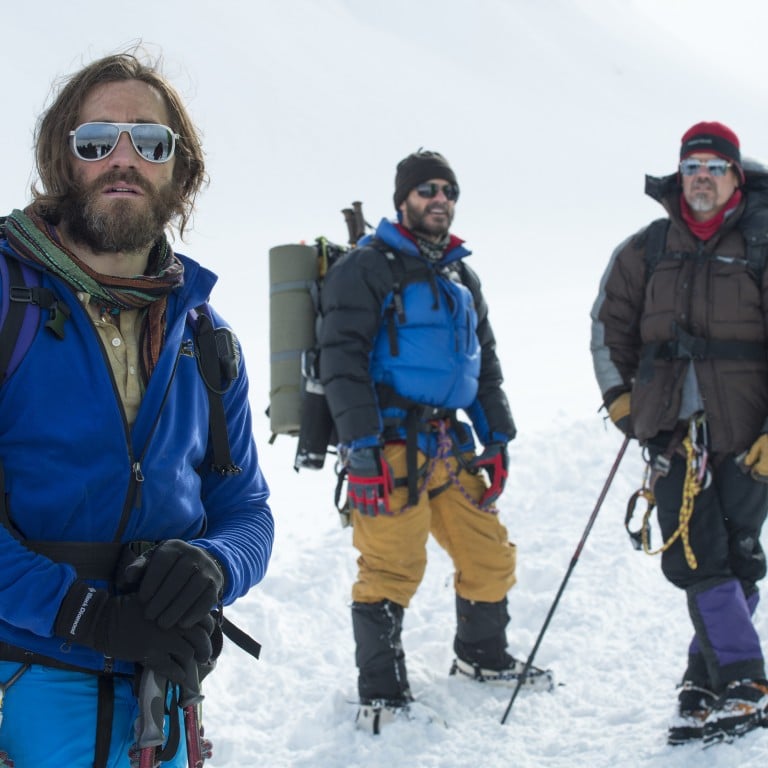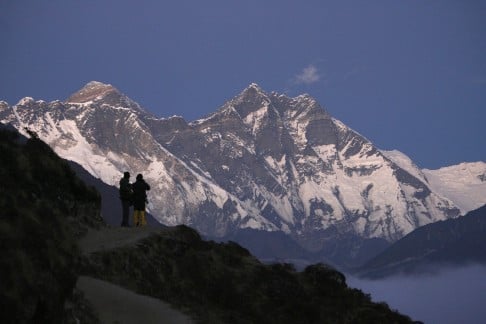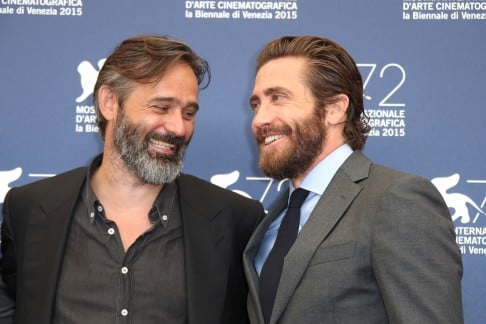
Journalist Jon Krakauer furious at his depiction in Everest film
Writer of Into Thin Air, bestseller about 1996 disaster on world's highest peak in which eight climbers died, says incident in film involving him never happened, and bemoans the fact its makers didn't consult him
Journalist Jon Krakauer has launched a furious attack on the makers of Everest - the film about the infamous 1996 climbing disaster on the world’s highest mountain - which depicts him as the writer who stays in his tent while his climbing teammates are marooned in a blizzard.
“It’s total bull,” Krakauer says of the film, which opened in cinemas this month. "Anyone who goes to that movie and wants a fact-based account should read [my book] Into Thin Air.”
Into Thin Air is the 1997 bestseller Krakauer wrote about his experience on Everest, when eight climbers died after getting trapped in an unexpected storm. The new Universal Pictures film about that fateful day, directed by Baltasar Kormakur, is not based on Krakauer’s book. He sold the memoir’s rights to Sony Pictures just as the book was published, and the studio went on to make a poorly reviewed television movie about the tragedy that same year.
“People told me, ’Movies never get made. Take the money. What do you have to lose?’” the writer, now 61, recalls. “I curse myself for selling it at all. What I learned from the TV movie was that dramatic films take dramatic licence, and when you sign a document, you can do whatever you want with me. It wasn’t worth the money I got.”
The writers and I tried to look at things from a fair point of view without choosing sides
No one asked for Krakauer’s input on Everest, and he says he was never approached by Michael Kelly, who played him in the film. In fact, he considers the film is a personal affront from Kormakur himself. He’s particularly aggrieved by a scene in which his character is asked to help with the rescue by Russian guide Anatoli Boukreev but replies he cannot because he is “snow blind”.
“I never had that conversation,” Krakauer says. “Anatoli came to several tents, and not even sherpas could go out. I’m not saying I could have, or would have. What I’m saying is, no one came to my tent and asked.”
Kormakur sent a reply through his publicist: “Our intention in the tent scene that Mr Krakauer mentions was to illustrate how helpless people were and why they might not have been able to go out and rescue people. . They were not malicious, they were helpless.”

The filmmaker said he had access to books written about the 1996 events on Everest, as well as “all the radio calls that went on in the Adventure Consultants camp”. (Krakauer was embedded with guide Rob Hall’s Adventure Consultants team on Everest, gathering material for an Outside magazine article.)
Furthermore, the director says, four advisers who were “present on the mountain during that disaster and participated in the rescue” worked on the movie. “The writers and I tried to look at things from a fair point of view without choosing sides,” Kormakur says in his statement.
It’s rich people climbing. It’s a trophy on the wall and they’re done. When I say I wish I’d never gone, I really mean that.
Still, the mention of the film causes Krakauer to bristle. And he’s not a particularly angry guy - or at least, he doesn’t seem that way. In his collared shirt, blue jeans and glasses, looking like the cool professor who conducts class on the quad when the weather’s warm, it’s hard to imagine him on Everest.
He is, by his own admission, a quiet guy. He lives in Boulder, in the US state of Colorado, with his wife, a botanist. "I’m a pretty weird person,” he says. “The last time my wife and I had someone over for dinner was maybe three years ago.”
That’s probably because he spends so much time working. He’s obsessive about research but hates writing itself. The stories he’s drawn to almost always have something to do with injustice: In recent years, he’s focused on National Football League player-turned-US Army soldier Pat Tillman, charity fraud allegations against Three Cups of Tea author Greg Mortenson and college campus rape.
“I’m interested in obsessive types,” he explains. “I think it’s a way of understanding myself. I’m not even religious, but I get fanaticism. I get the appeal of it. When I was 23, I climbed this mountain in Alaska called Devil’s Thumb alone. It was incredibly dangerous, and I did it because if I thought that if I did something that hard and pulled it off, my life was gonna be transformed. And of course, nothing happened. But I get the search for purpose. Happiness means nothing to me. I just want to have meaning and purpose.”

Needless to say, his work often gets under his skin and stays there for a while. He feels a “moral obligation” to help the victims - which is probably why he still feels so guilty about what happened on Everest nearly 20 years ago. In the new film, the idea is floated that Krakauer’s presence on the mountain pushed Hall to take unnecessary risks. Krakauer agrees with this: “They were taking chances trying to get clients to the summit because I was there.”
After he returned home from Nepal and the weight of what he’d seen on the mountain sunk in, Krakauer found himself in a deep depression. It wasn’t until a decade later, when he met a number of war veterans while working on his Tillman book, that he realised he had post-traumatic stress disorder. He’s been going to weekly group therapy meetings for the last four years.
“I was messed up for years,” he says. “Depressed and I didn’t even know it.”
Still, he finds his way back to the mountains. He says he can go out of his back door in Colorado and embark on world-class rock climbs - “the way people play tennis in Beverly Hills.” Jimmy Chin, who directed Meru, a documentary out this month in the US about climbers attempting to scale a 6,500-metre Himalayan mountain, calls Krakauer a “dark horse” of the climbing world with a legacy of risky first ascents.
I was messed up for years. Depressed and I didn't even know it
“We just went on a rock wall the other day in New York City and Jon was climbing higher than me,” says Chin, who’s about two decades Krakauer’s junior. “I watched Everest, and I can see how people might misconstrue his character. He comes on strong. And because most people don’t have the balls to have an opinion, it’s hard for some to handle those who do.”
So if people think he’s a jerk after watching Everest, Krakauer says, so be it. It comes with the job. He’s written about people who thought they were conveyed inappropriately, too. But he wants one thing to remain clear: Summitting the mountain isn’t a point of pride - it’s a regret.
“Everest is not real climbing. It’s rich people climbing. It’s a trophy on the wall and they’re done,” he says. “When I say I wish I’d never gone, I really mean that.”
